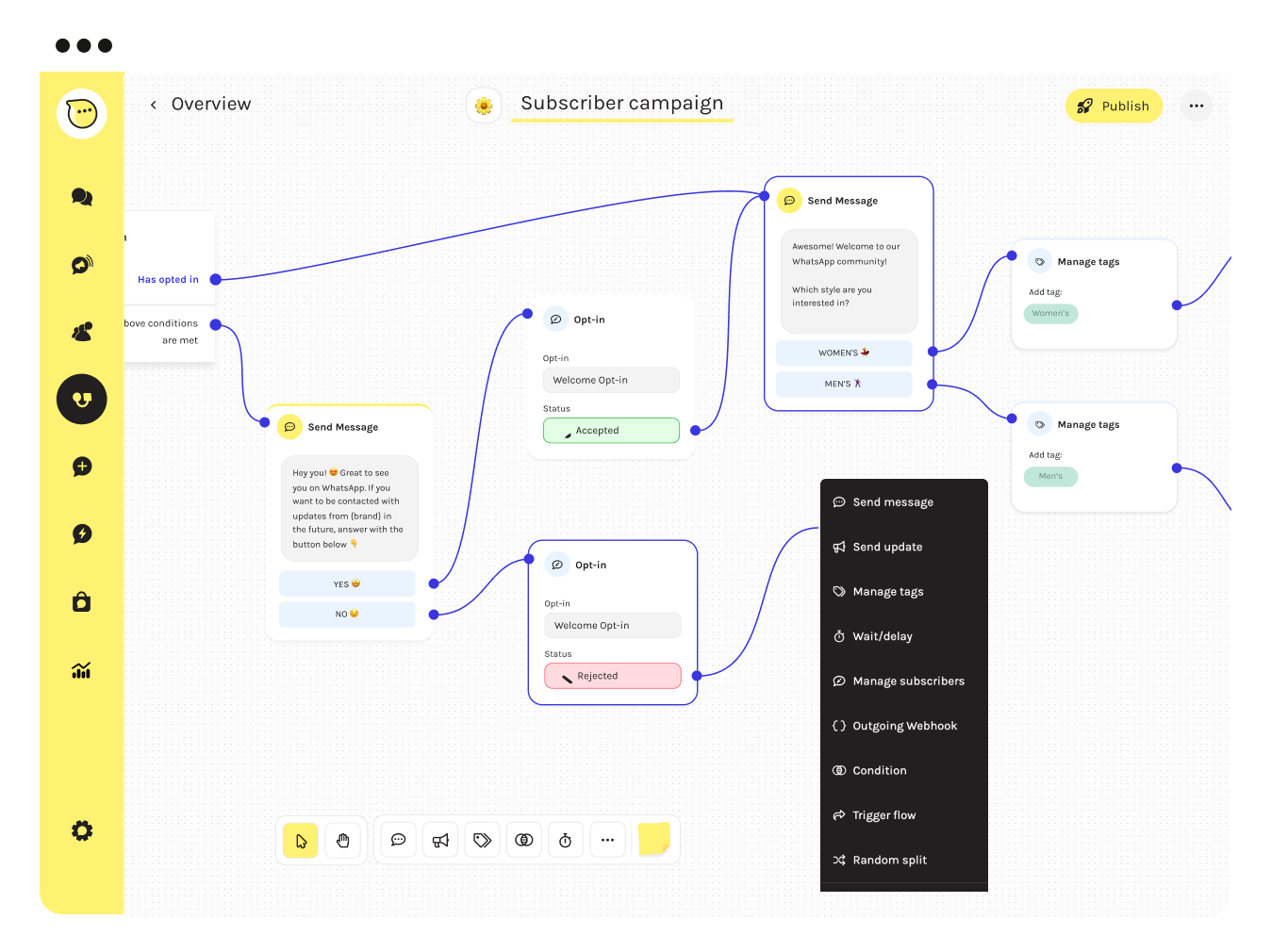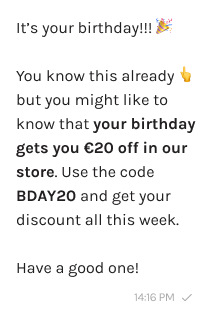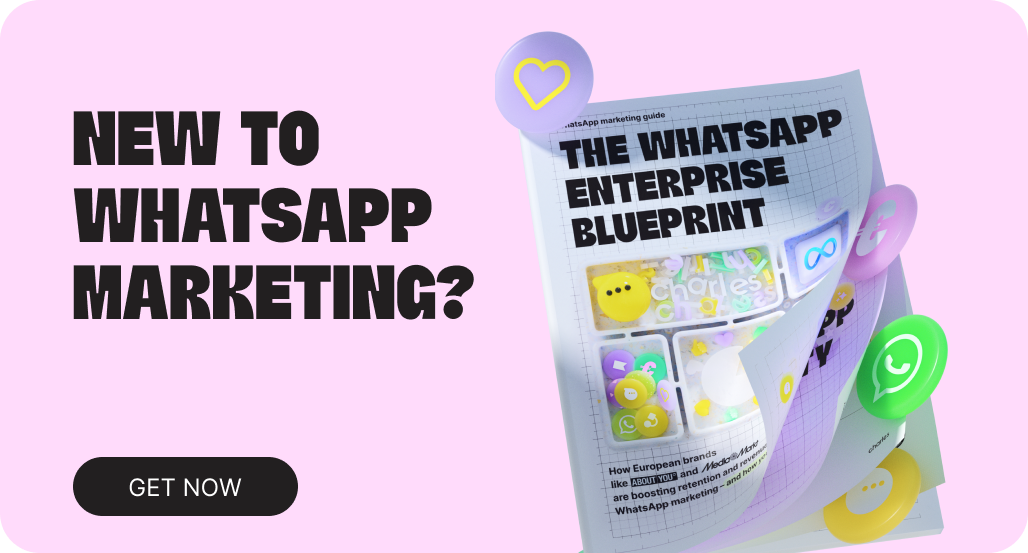Table of Contents
How can WhatsApp bring together online and offline customer interactions for better engagement? Read on to learn the benefits of WhatsApp as part of your omnichannel strategy.
Brands looking to start with WhatsApp marketing often wonder how it fits into an omnichannel marketing strategy.
Or if it can be part of one.
How do you use WhatsApp to connect online and offline, and vice versa?
This is understandable. WhatsApp may be a powerful revenue and retention channel now used by hundreds of enterprise businesses, but it's still new to many.
That's what we're here for. Here, we share the details of:
 A WhatsApp opt-in showing the double opt-in process (for GDPR) while also using the chance to collect data about customers. Shown in charles' WhatsApp automation feature, Journeys.
A WhatsApp opt-in showing the double opt-in process (for GDPR) while also using the chance to collect data about customers. Shown in charles' WhatsApp automation feature, Journeys.
Why WhatsApp for your marketing?
With over 2 billion users worldwide, WhatsApp’s ubiquitous presence makes it an ideal platform for brands to integrate their offline and online marketing strategies.
Its high engagement rates — with open rates that can be around 85 — surpass traditional channels like email, making it a potent tool for personal communication. And customers love the 2-ways interaction made possible with the WhatsApp Business API (that can be accessed through a platform like charles).
WhatsApp also allows for rich media interactions, including images, videos, and interactive messages, enhancing the customer experience significantly.
Why WhatsApp is essential for omnichannel success
Incorporating WhatsApp into your marketing strategy opens a direct line of communication with customers, enhancing both the WhatsApp online and offline experience.
This strategy not only increases engagement but also builds lasting relationships that foster loyalty and repeat business.
 For more on customer loyalty in WhatsApp, see our blog post: Why WhatsApp is a great customer retention tool [+ 7 WhatsApp templates]
For more on customer loyalty in WhatsApp, see our blog post: Why WhatsApp is a great customer retention tool [+ 7 WhatsApp templates]
5 benefits of a WhatsApp omnichannel strategy
Here's a summary of 5 business benefits of WhatsApp as part of your omnichannel strategy.
- Seamless customer communication: WhatsApp allows for instant and direct communication with customers, whether they're shopping online or in-store. This makes it easy to answer questions, provide support, and send updates in real time.
- High engagement rates: WhatsApp messages have incredibly high open and response rates compared to traditional emails. This means your messages are more likely to be seen and acted upon, leading to better customer engagement.
- Personalized customer experience: By integrating WhatsApp with your CRM, you can send personalized messages based on customer preferences and purchase history. This helps make your interactions more relevant and engaging.
- Enhanced customer loyalty: Regular, personalized communication through WhatsApp helps build stronger relationships with your customers. When customers feel valued and understood, they are more likely to remain loyal to your brand.
- Powerful data collection: WhatsApp interactions provide valuable data about customer behavior and preferences. This valuable first-party data can be used to tailor marketing strategies, improve products, and enhance overall customer experience – and is increasingly important if it becomes a cookieless world.
60% of senior executives say that the loss of third-party cookies will have a disruptive effect on their marketing
Key strategies for WhatsApp omnichannel integration
Here's how to put this into practice and embed WhatsApp in your omnichannel strategy:
1. Blend in-store and online interactions
Integrating WhatsApp helps bridge the gap between physical retail and e-commerce. QR codes in-store can connect customers instantly on WhatsApp to access more information, check product availability, or secure exclusive offers. This connection continues beyond the store, enhancing the WhatsApp business omnichannel experience by maintaining ongoing conversations.
In practice: a shopper sees a QR code next to the shoes they like in your store. They scan it with their phone and immediately get a message on WhatsApp with more details or an exclusive discount.
2. Offer real-time customer service
WhatsApp enables immediate customer support, providing quick answers to queries about products or services. This swift communication is key for an effective WhatsApp omnichannel strategy, ensuring customers feel supported throughout their shopping journey, encouraging them to come back.
In practice: Customers can ask about sizes, colors, or the status of their order and get answers right away from your agents. Common queries can be automated to take the repetitive work away from your team.
3. Enhance post-purchase communication
Keeping in touch after a purchase is crucial. WhatsApp facilitates direct updates about orders, shipping details, and feedback requests. This strategy not only improves customer satisfaction but also opens the door to further personalized interactions and repeat purchases.
In practice: After a customer buys something, whether online or offline, WhatsApp can be a direct line for you to send them updates about their order or even ask for feedback. It’s also perfect for sending a quick thank you message with a personalized offer to keep them engaged.
4. Use data for personalized marketing
Collecting and using customer data for personalized messaging is a cornerstone of a strong WhatsApp omnichannel strategy. Integrating with CRM systems allows for targeted communications based on previous interactions, purchase history, and customer preferences, enhancing the relevance of each message.
In practice: When you connect WhatsApp with your customer database, you can send messages that really matter to each customer. Say it’s their birthday, or they’ve just made their tenth purchase; a quick, personalized note on WhatsApp can make them feel valued and strengthen their loyalty to your brand.
 Customers love to get a birthday greeting on WhatsApp, especially if there's a small gift attached. In this example, customers get an extra incentive to go in-store.
Customers love to get a birthday greeting on WhatsApp, especially if there's a small gift attached. In this example, customers get an extra incentive to go in-store.
Why choose charles for your WhatsApp omnichannel strategy?
At charles, we're experts at supporting brands with their WhatsApp omnichannel strategies and finding ways to drive revenue and retention.
Here's why numerous leading European brands use us as their WhatsApp software partner:
- Deep WhatsApp expertise: We have experience helping leading consumer brands succeed with WhatsApp marketing – through our software and support.
- Comprehensive CRM and service integrations: charles integrates effortlessly with your existing tech stack, like Emarsys and Zendesk, synchronizing data and simplifying the management of customer interactions across platforms.
- Passionate support: Our team is dedicated to your success, providing ongoing guidance and insights to help you optimize your WhatsApp campaigns and understand their impact.
- Proven track record: charles is the chosen partner for brands like Jack Wolfskin and Dermalogica, and any brand looking to enhance their marketing efforts through WhatsApp. See our customer stories here.
- Revenue and retention focus: We know that numbers matter to marketing and CRM teams. We're laser-focused on helping brands create a WhatsApp omnichannel strategy that pushes forward KPIs.

To sum up: WhatsApp is part of any future-looking omnichannel strategy
WhatsApp Business and marketing is already popular in countries like Brazil and India.
It's now growing fast in Europe thanks to investment from Meta and a huge uptake in WhatsApp Business app and API from businesses – with consumers also signing up for WhatsApp communications in their millions.
WhatsApp moves beyond traditional methods to create a more connected and personalized shopping experience. It also enables brands to collect valuable first-party customer data, which is increasingly important in a cookieless world.
Any CRM or marketing team looking to grow customer loyalty and boost revenue in the long-term needs to have WhatsApp as part of its omnichannel strategy.
With the right software partner and integrations, it should be straightforward to add WhatsApp to your marketing mix, and the results should be more than worth it.
Start WhatsApp omnichannel marketing the right way with charles
Ready to transform how you interact with customers? Let’s discuss how WhatsApp can enhance your online and offline omnichannel strategy.


